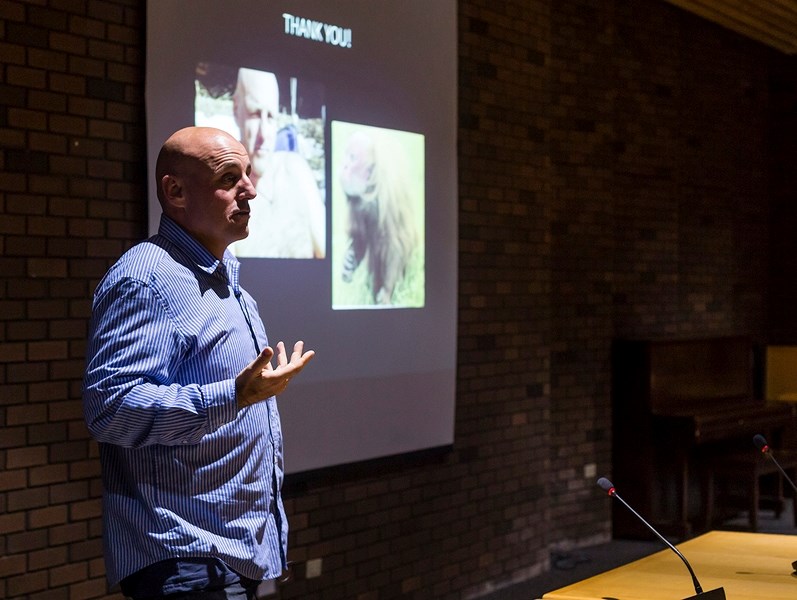Did you know humans share 35 per cent of their genome with daffodils?
On Nov. 15, Athabasca University associate professor of biological anthropology Dr. Hugh Notman dispelled some common myths about primate similarities and differences during Science Outreach — Athabasca’s last presentation of the fall season, “The Ape in You: What it means to be two per cent human”.
Notman’s area of research is in primatology, a diverse study between mammalogy and anthropology. He has mainly focused on cognition and language in primates and has done research with wild primates in Uganda, Belize and South Africa.
In his presentation, Notman went through some of his research on language in primates, how women have shaped the primatology field and what the two-per-cent difference really is between humans and apes.
“You often hear that chimpanzees have a special relationship with us. We share 98 per cent of our DNA with them,” Notman said. “That’s a pretty profound statistic if we take it at face value. Are we really 98 per cent chimpanzee, and that two per cent that’s different – is that our entire humanness?”
In order to dispel a common myth that humans evolved from chimpanzees, Notman said this would imply chimpanzees have been around for millions of years without evolving. In reality, humans and chimpanzees would have shared a common ancestor, but scientists are unsure what that ancestor looked like.
“I think this idea of progress and evolution can get a little bit dangerous. It implies we are the end product; we’ve reached the culmination,” he said. “Really, it’s an ongoing process and it’s something that never really ends.”
On the subject of women’s contribution to primatology, Notman said in the early times of primatology, from the 1940s to the early 1960s, the field was extremely male-dominated and men were rigidly trained in certain rules where they would often only observe male primates.
Louis Leakey, who is famous for discovering the earliest hominid fossils, decided he wanted to have an untrained woman study apes in the wild, because “women will see things differently women.” This is when Jane Goodall, best known for her work with chimpanzees in Tanzania, entered the picture, along with Dian Fossey and Canadian Birute Galdikas.
“These women inspired a lot of other women to get into the field, and they totally opened up the field of primatology and suddenly realized everything we knew about primatology was wrong,” Notman said. “Once more females got into the field – more women – it really did change how we look at primates and primate societies.”
Science Outreach member Carmen Allen said Notman was really good at making the presentation relevant, and she did not know anything about primatology before.
“I know I was really interested in primates when I was a kid, and I remember learning about Jane Goodall and all those guys, so it was kind of neat to learn about them from another perspective.”
Science Outreach — Athabasca co-ordinator Linda Lindballe said the presentation drew a good turnout.
“I think we have a good following of people that are interested in science or science-related topics in the community,” she said. “It’s not only an educational experience, but it’s an entertaining outing for them.”
The next Science Outreach — Athabasca presentation, “How the Clean Energy Rvolution is Changing Your Future,” will be made by David Dodge on Jan. 11 at Athabasca University.



